Global Light Management System Market: By Type, By Application, By Control Type, By Region & Segmental Insights Trends and Forecast, 2024 – 2034
- Industry: Semiconductors & Electronics
- Report ID: TNR-110-1138
- Number of Pages: 420
- Table/Charts : Yes
- June, 2024
- Base Year : 2024
- No. of Companies : 10+
- No. of Countries : 29
- Views : 10157
- Covid Impact Covered: Yes
- War Impact Covered: Yes
- Formats : PDF, Excel, PPT
A light management system (LMS) is an advanced framework designed to optimize and control lighting within various environments, including residential, commercial, and industrial spaces. It integrates multiple technologies such as sensors, controllers, and communication modules to manage lighting based on occupancy, daylight availability, and user preferences. The primary goal of an LMS is to enhance energy efficiency, reduce operational costs, and improve the overall user experience.
These systems enable automated and remote control of lighting fixtures through centralized or decentralized networks, often utilizing Internet of Things (IoT) capabilities. LMS can adjust lighting levels dynamically, ensuring optimal illumination while minimizing energy consumption. They are also capable of providing data analytics and insights into usage patterns, which can inform maintenance and further efficiency improvements. With growing environmental concerns and regulatory pressures, LMS play a crucial role in sustainable building management by supporting green building practices and reducing carbon footprints.
The demand for light management systems is driven by a combination of technological, environmental, and economic factors. One primary driver is the increasing need for energy efficiency and sustainability in building management. As governments worldwide implement stricter regulations and offer incentives for reducing energy consumption, businesses and homeowners are turning to light management systems to comply and benefit financially. Technological advancements, particularly in IoT and AI, enable more sophisticated and adaptive lighting solutions that can be controlled remotely and automated based on real-time conditions, enhancing convenience and efficiency.
Additionally, the rise of smart homes and smart cities is accelerating the adoption of these systems, as they provide integrated and intelligent control over lighting environments. The growing awareness of the long-term cost savings from reduced energy bills and maintenance expenses also drives market growth. Furthermore, heightened environmental consciousness among consumers and corporations encourages the use of sustainable lighting practices, making light management systems an essential component in modern building strategies.
In terms of revenue, the global light management system market was worth US$ 32.3 Bn in 2023, anticipated to witness CAGR of 17.2% during 2024 – 2034.
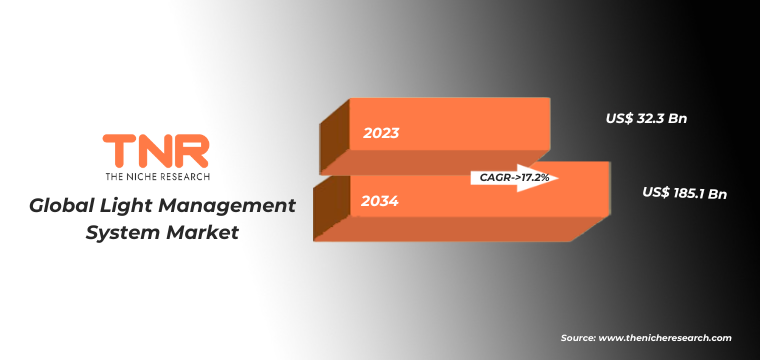
Global Light Management System Market Dynamics
Energy Efficiency Regulations: Governments worldwide are enforcing stringent energy efficiency regulations, pushing the adoption of light management systems to reduce energy consumption and carbon emissions. Innovations in IoT and smart technology enable more precise and automated control of lighting systems, enhancing functionality and efficiency.
Smart City Initiatives: The development of smart cities incorporates advanced light management systems to optimize urban lighting, improve public safety, and reduce operational costs. Growing environmental consciousness drives businesses and consumers to adopt sustainable lighting solutions that minimize energy usage and reduce carbon footprints.
Cost Savings: Long-term cost benefits, through reduced energy bills and maintenance costs, make light management systems an attractive investment for residential, commercial, and industrial sectors. Personalized and adaptive lighting solutions improve comfort and productivity, making light management systems desirable for both residential and workplace settings.
Consumer Demand for Smart Homes: The growing popularity of smart homes equipped with connected devices drives demand for integrated lighting solutions. Consumers seek convenience, control, and customization, which light management systems provide. Rapid development and modernization of urban infrastructure, especially in developing regions, create a substantial demand for efficient lighting management systems.
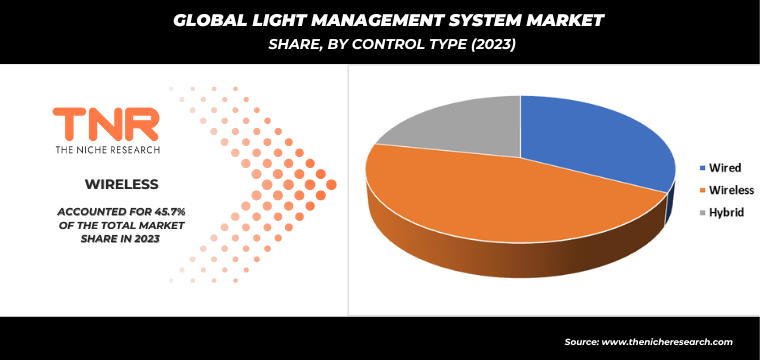
Hardware Segment Has Garnered Major Market Share in the Global Light Management System Market During the Forecast Period (2024 – 2034).
The demand for hardware components in light management systems is significantly driven by the rapid advancements in smart technology and the growing focus on energy efficiency. Key hardware elements such as sensors, controllers, and communication modules are essential for enabling intelligent lighting solutions that can adapt to varying conditions and user preferences. The integration of IoT technology facilitates real-time data collection and analysis, allowing for precise control and automation of lighting systems.
Furthermore, government regulations and incentives promoting energy conservation push the adoption of advanced hardware to meet these standards. The increasing trend of smart homes and buildings, which require seamless interoperability among various devices, also propels the demand for robust and compatible hardware components. These factors collectively drive the market for sophisticated hardware in light management systems, as they provide the necessary infrastructure to optimize lighting performance, reduce energy consumption, and enhance user experience.
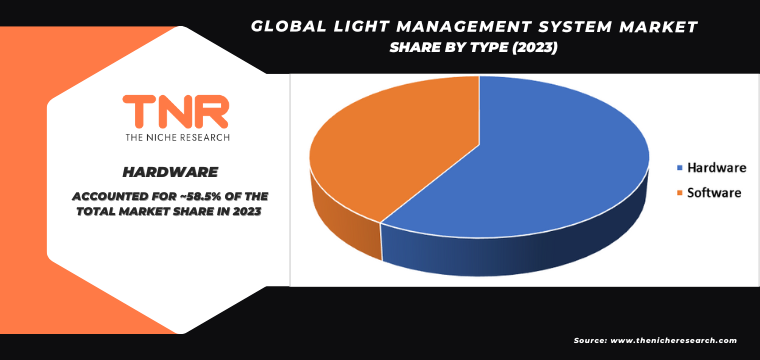
By Application Indoor Lighting Segment had the Highest Share in the Global Light Management System Market in 2023.
The demand for indoor light management systems is increasingly driven by the pursuit of enhanced energy efficiency and cost savings within residential, commercial, and industrial environments. Businesses and homeowners are becoming more aware of the financial and environmental benefits of reducing energy consumption, which is achievable through the implementation of advanced lighting controls.
These systems, often integrated with smart technologies and IoT devices, allow for precise control over lighting conditions, adapting to occupancy, natural light availability, and specific user needs. Government regulations and green building standards also mandate higher energy efficiency, further accelerating adoption. Additionally, the rise of remote work and flexible office environments necessitates adaptable lighting solutions that enhance comfort and productivity. The ability to remotely monitor and adjust lighting not only offers convenience but also ensures optimal energy usage, thus driving the growing preference for sophisticated indoor light management systems.
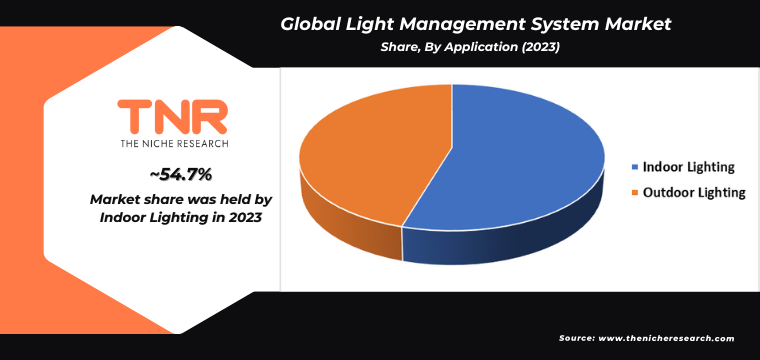
By Region, North America Dominated the Global Light Management System Market in 2023.
The demand for light management systems in North America is being driven by several key factors. One primary driver is the increasing emphasis on energy efficiency and sustainability, spurred by stringent government regulations and incentives aimed at reducing carbon footprints. The adoption of smart city initiatives across major urban centers also propels the need for advanced lighting solutions that offer better control and energy savings.
Moreover, the rising trend of IoT (Internet of Things) integration in buildings and infrastructure enhances the appeal of light management systems, as these systems enable intelligent lighting controls that can adapt to real-time conditions and occupancy patterns. Additionally, the growing awareness among businesses and homeowners about the long-term cost benefits and environmental impact of efficient lighting further fuels market growth. These combined factors are pushing the adoption of sophisticated light management systems across residential, commercial, and industrial sectors, making it a rapidly expanding market in North America.
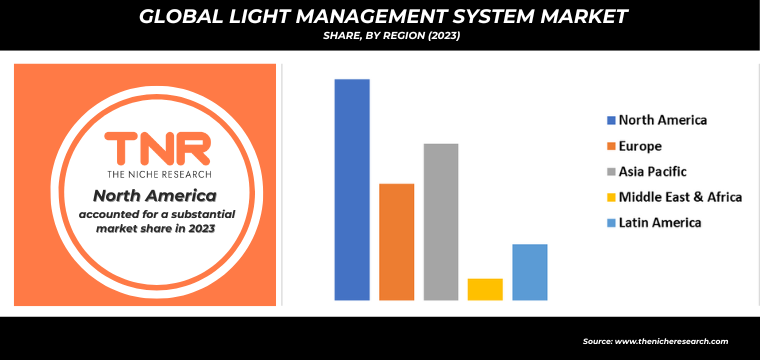
Competitive Landscape: Global Light Management System Market:
- Acuity Brands Lighting Inc.
- Cree Inc.
- Crestron Electronics, Inc.
- Eaton Corporation
- General Electric Company
- Honeywell HBT.
- Hubbell Incorporated
- Legrand SA
- Leviton Manufacturing Co., Inc.
- Lutron Electronics Co. Inc.
- Philips Lighting
- Schneider Electric SE
- TRILUX GmbH & Co. KG
- WAGO
- Other Market Participants
Global Light Management System Market Scope
| Report Specifications | Details |
| Market Revenue in 2023 | US$ 32.3 Bn |
| Market Size Forecast by 2034 | US$ 185.1 Bn |
| Growth Rate (CAGR) | 17.2% |
| Historic Data | 2016 – 2022 |
| Base Year for Estimation | 2023 |
| Forecast Period | 2024 – 2034 |
| Report Inclusions | Market Size & Estimates, Market Dynamics, Competitive Scenario, Trends, Growth Factors, Market Determinants, Key Investment Segmentation, Product/Service/Solutions Benchmarking |
| Segments Covered | By Type, By Application, By Control Type, By Region |
| Regions Covered | North America, Europe, Asia Pacific, Middle East & Africa, Latin America |
| Countries Covered | U.S., Canada, Mexico, Rest of North America, France, The UK, Spain, Germany, Italy, Nordic Countries (Denmark, Finland, Iceland, Sweden, Norway), Benelux Union (Belgium, The Netherlands, Luxembourg), Rest of Europe, China, Japan, India, New Zealand, Australia, South Korea, Southeast Asia (Indonesia, Thailand, Malaysia, Singapore, Rest of Southeast Asia), Rest of Asia Pacific, Saudi Arabia, UAE, Egypt, Kuwait, South Africa, Rest of Middle East & Africa, Brazil, Argentina, Rest of Latin America |
| Key Players | Acuity Brands Lighting Inc., Cree Inc., Crestron Electronics, Inc., Eaton Corporation, General Electric Company, Honeywell HBT., Hubbell Incorporated, Legrand SA, Leviton Manufacturing Co., Inc., Lutron Electronics Co. Inc., Philips Lighting, Schneider Electric SE, TRILUX GmbH & Co. KG, WAGO |
| Customization Scope | Customization allows for the inclusion/modification of content pertaining to geographical regions, countries, and specific market segments. |
| Pricing & Procurement Options | Explore purchase options tailored to your specific research requirements |
| Contact Details | Consult With Our Expert
Japan (Toll-Free): +81 663-386-8111 South Korea (Toll-Free): +82-808- 703-126 Saudi Arabia (Toll-Free): +966 800-850-1643 United Kingdom: +44 753-710-5080 United States: +1 302-232-5106 E-mail: askanexpert@thenicheresearch.com
|
Global Light Management System Market
By Type
- Hardware
- Control Devices
- Basic lighting controls
- Pre-set lighting controls
- Integrated Lighting Controls
- Assisted lighting controls
- Sensors
- Occupancy Sensors
- Motion sensor controls
- Daylight Sensors
- Photosensor
- Others
- Dimmers
- Others
- Control Devices
- Software
By Application
- Indoor Lighting
- Commercial Buildings
- Offices
- Industrial Spaces
- Retail Spaces
- Residential Buildings
- Outdoor Lighting
By Control Type
- Wired
- Wireless
- Hybrid
By Region
- North America (U.S., Canada, Mexico, Rest of North America)
- Europe (France, The UK, Spain, Germany, Italy, Nordic Countries (Denmark, Finland, Iceland, Sweden, Norway), Benelux Union (Belgium, The Netherlands, Luxembourg), Rest of Europe)
- Asia Pacific (China, Japan, India, New Zealand, Australia, South Korea, Southeast Asia (Indonesia, Thailand, Malaysia, Singapore, Rest of Southeast Asia), Rest of Asia Pacific)
- Middle East & Africa (Saudi Arabia, UAE, Egypt, Kuwait, South Africa, Rest of Middle East & Africa)
- Latin America (Brazil, Argentina, Rest of Latin America)
Report Layout:
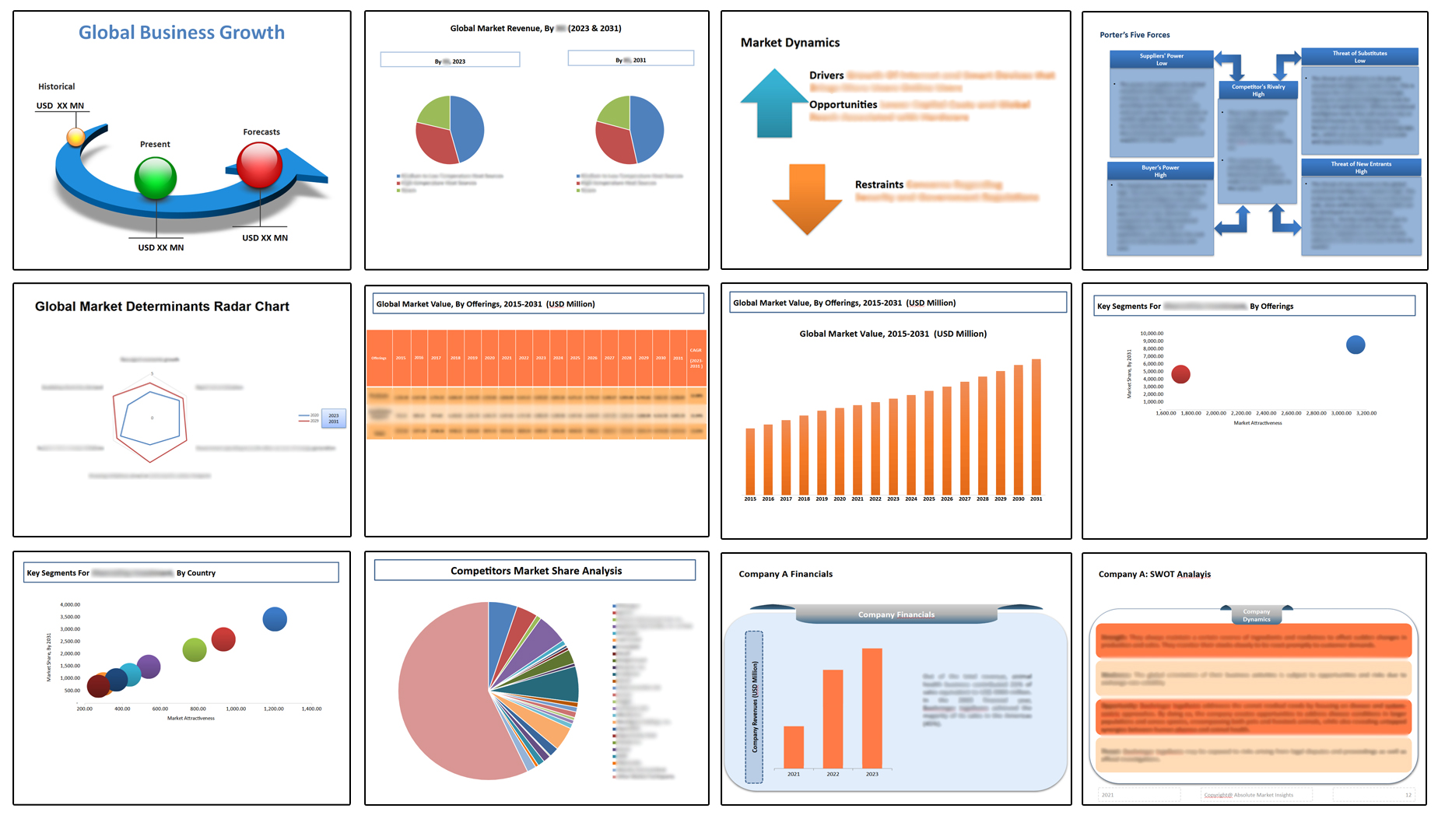
Table of Contents
Note: This ToC is tentative and can be changed according to the research study conducted during the course of report completion.
**Exclusive for Multi-User and Enterprise User.
Global Light Management System Market
By Type
- Hardware
- Control Devices
- Basic lighting controls
- Pre-set lighting controls
- Integrated Lighting Controls
- Assisted lighting controls
- Sensors
- Occupancy Sensors
- Motion sensor controls
- Daylight Sensors
- Photosensor
- Others
- Dimmers
- Others
- Control Devices
- Software
By Application
- Indoor Lighting
- Commercial Buildings
- Offices
- Industrial Spaces
- Retail Spaces
- Residential Buildings
- Outdoor Lighting
By Control Type
- Wired
- Wireless
- Hybrid
By Region
- North America (U.S., Canada, Mexico, Rest of North America)
- Europe (France, The UK, Spain, Germany, Italy, Nordic Countries (Denmark, Finland, Iceland, Sweden, Norway), Benelux Union (Belgium, The Netherlands, Luxembourg), Rest of Europe)
- Asia Pacific (China, Japan, India, New Zealand, Australia, South Korea, Southeast Asia (Indonesia, Thailand, Malaysia, Singapore, Rest of Southeast Asia), Rest of Asia Pacific)
- Middle East & Africa (Saudi Arabia, UAE, Egypt, Kuwait, South Africa, Rest of Middle East & Africa)
- Latin America (Brazil, Argentina, Rest of Latin America)
The Niche Research approach encompasses both primary and secondary research methods to provide comprehensive insights. While primary research is the cornerstone of our studies, we also incorporate secondary research sources such as company annual reports, premium industry databases, press releases, industry journals, and white papers.
Within our primary research, we actively engage with various industry stakeholders, conducting paid interviews and surveys. Our meticulous analysis extends to every market participant in major countries, allowing us to thoroughly examine their portfolios, calculate market shares, and segment revenues.
Our data collection primarily focuses on individual countries within our research scope, enabling us to estimate regional market sizes. Typically, we employ a bottom-up approach, meticulously tracking trends in different countries. We analyze growth drivers, constraints, technological innovations, and opportunities for each country, ultimately arriving at regional figures.Our process begins by examining the growth prospects of each country. Building upon these insights, we project growth and trends for the entire region. Finally, we utilize our proprietary model to refine estimations and forecasts.
Our data validation standards are integral to ensuring the reliability and accuracy of our research findings. Here’s a breakdown of our data validation processes and the stakeholders we engage with during our primary research:
- Supply Side Analysis: We initiate a supply side analysis by directly contacting market participants, through telephonic interviews and questionnaires containing both open-ended and close-ended questions. We gather information on their portfolios, segment revenues, developments, and growth strategies.
- Demand Side Analysis: To gain insights into adoption trends and consumer preferences, we reach out to target customers and users (non-vendors). This information forms a vital part of the qualitative analysis section of our reports, covering market dynamics, adoption trends, consumer behavior, spending patterns, and other related aspects.
- Consultant Insights: We tap into the expertise of our partner consultants from around the world to obtain their unique viewpoints and perspectives. Their insights contribute to a well-rounded understanding of the markets under investigation.
- In-House Validation: To ensure data accuracy and reliability, we conduct cross-validation of data points and information through our in-house team of consultants and utilize advanced data modeling tools for thorough verification.
The forecasts we provide are based on a comprehensive assessment of various factors, including:
- Market Trends and Past Performance (Last Five Years): We accurately analyze market trends and performance data from preceding five years to identify historical patterns and understand the market’s evolution.
- Historical Performance and Growth of Market Participants: We assess the historical performance and growth trajectories of key market participants. This analysis provides insights into the competitive landscape and individual company strategies.
- Market Determinants Impact Analysis (Next Eight Years): We conduct a rigorous analysis of the factors that are projected to influence the market over the next eight years. This includes assessing both internal and external determinants that can shape market dynamics.
- Drivers and Challenges for the Forecast Period:Identify the factors expected to drive market growth during the forecast period, as well as the challenges that the industry may face. This analysis aids in deriving an accurate growth rate projection.
- New Acquisitions, Collaborations, or Partnerships: We keep a close watch on any new acquisitions, collaborations, or partnerships within the industry. These developments can have a significant impact on market dynamics and competitiveness.
- Macro and Micro Factors Analysis:A thorough examination of both macro-level factors (e.g., economic trends, regulatory changes) and micro-level factors (e.g., technological advancements, consumer preferences) that may influence the market during the forecast period.
- End-User Sentiment Analysis: To understand the market from the end-user perspective, we conduct sentiment analysis. This involves assessing the sentiment, preferences, and feedback of the end-users, which can provide valuable insights into market trends.
- Perspective of Primary Participants: Insights gathered directly from primary research participants play a crucial role in shaping our forecasts. Their perspectives and experiences provide valuable qualitative data.
- Year-on-Year Growth Trend: We utilize a year-on-year growth trend based on historical market growth and expected future trends. This helps in formulating our growth projections, aligning them with the market’s historical performance.
Research process adopted by TNR involves multiple stages, including data collection, validation, quality checks, and presentation. It’s crucial that the data and information we provide add value to your existing market understanding and expertise. We have also established partnerships with business consulting, research, and survey organizations across regions and globally to collaborate on regional analysis and data validation, ensuring the highest level of accuracy and reliability in our reports.








